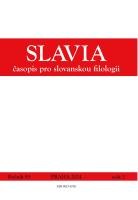Polskie interpretacje dramatu Elektra J. Giraudoux – w translacji i na scenie
The Polish Interpretations of the Drama Électre by J. Giraudoux – in Translation and on the Stage
Author(s): Krystyna ModrzejewskaSubject(s): Theatre, Dance, Performing Arts, Language and Literature Studies, Fine Arts / Performing Arts, Cultural history, Studies of Literature, Polish Literature, Translation Studies, Sociology of Literature
Published by: AV ČR - Akademie věd České republiky - Slovanský ústav and Euroslavica
Keywords: Jean Giraudoux; Jarosław Iwaszkiewicz; Edmund Wierciński; ambiguities; political decision; Polish theatre; French drama;
Summary/Abstract: The poetics and metaphors in the play Électre (1937) by J. Giraudoux pose a significant challenge for the translators and creators of a theater performance. Jarosław Iwaszkiewicz’s translation in 1941 emphasized dialogue and style – tragedy blending humor and fantasy, unknown in the Polish theatre tradition. The drama, directed by Edmund Wierciński on the Poetic Stage of the Polish Army Theater (Łódź, 16 II 1946), with a numerous cast, wonderful decorations and costumes, marked a great artistic event. The audience was delighted, but critics, unable to accept the ambiguities of the play, attacked the creators. This led to a political decision to close the stage, turning success into failure.
Journal: Slavia - časopis pro slovanskou filologii
- Issue Year: XCIII/2024
- Issue No: 2
- Page Range: 155-164
- Page Count: 10
- Language: Polish
- Content File-PDF

